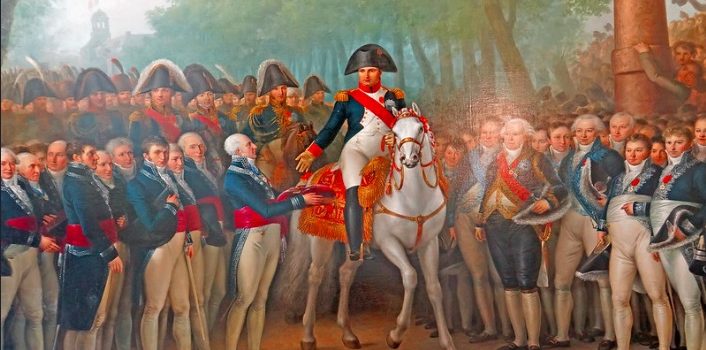

This article is an excerpt from the Shortform summary of "The 48 Laws of Power" by Robert Greene. Shortform has the world's best summaries of books you should be reading.
Like this article? Sign up for a free trial here .
Who was Charles-Maurice de Talleyrand-Périgord? And how did the aristocrat manage to remain a powerful French diplomat and politician after the French Revolution brought down the monarchy? In particular, what can we learn by analyzing the Talleyrand-Napoleon relationship?
The Talleyrand-Napoleon relationship was a complex one. Napoleon didn’t trust Talleyrand, but Talleyrand was too good an aide to give up. We’ll cover the 7 lessons about maintaining power we can learn from analyzing the Talleyrand-Napoleon relationship and Talleyrand’s canny diplomacy strategies.
Talleyrand-Napoleon Lesson #1: Be Wary of Friends; Use Enemies
The Talleyrand-Napoleon Story: As Napoleon’s foreign minister, Talleyrand needed an ally to help him thwart Napoleon when he decided his boss was leading France to ruin. He turned to Fouche, the head of the secret police who had previously tried to assassinate him. Talleyrand knew Fouche would work to prove himself, and they shared a mutual self-interest in undercutting Napoleon. While they didn’t succeed against Napoleon at the time, they developed a relationship that proved to be profitable later.
The Lesson: Keep a close eye on your friends — they easily become envious and resentful, and will undermine you. In contrast, if you promote an enemy, he’ll be more loyal than a friend in an effort to prove himself. So use your enemies. If you lack enemies, you should create some.
Principles of Lesson #1
When you’re in a position of power, beware of hiring a friend. Hiring friends weakens you because your friend is rarely the one who can help you the most. You need skill and competence more than friendship. Also, friendly feelings can get in the way of what needs to be done.
Enemies can be more useful than friends when you can co-opt them. The key to choosing which ones is gauging who is best able to further your interests. When you can overcome past grievances and enlist an enemy in your service, he can be a great resource.
Other uses for enemies include:
- Keeping you on your toes: Without enemies, you get lazy. An enemy at your heels keeps you alert and focused. Thus, it’s better to maintain some enemies as enemies rather than converting them into allies.
- Enhancing your reputation among followers: You can use enemies to portray yourself as a fighter for the people.
In any case, don’t worry about having open opposition. You’re better off with a declared opponent (whom you can possibly convert) than with hidden enemies.
Talleyrand-Napoleon Lesson #2: Bait Your Enemy
The Talleyrand-Napoleon Story:
In 1814 the powers of Europe banished Napoleon to the island of Elba and celebrated his fallen empire, but they still feared him because they hadn’t sent him far enough away, and they knew he was clever enough to retake power. However, his former minister, Talleyrand, wasn’t concerned — he quietly planned to purposely lure Napoleon back to France, where he could be permanently defeated.
Napoleon fell for the trap. Talleyrand set up a plan that allowed Napoleon to escape the island and return to France. The French people supported him and the government soldiers sent to stop him changed sides. He resumed the throne, but with France bankrupt, the people were miserable and the military was weak. As Talleyrand anticipated, Napoleon didn’t last long — he took the country to war and was defeated at the Battle of Waterloo, and exiled to a more distant island from which he couldn’t escape.
Talleyrand had the power of the upper hand because he planned carefully, bided his time, and set a successful trap for Napoleon.
The Lesson: Make your opponent come to you. When you force others to act, you’re in control. Bait them, then attack.
Principles of Lesson #2
Many people achieve power through aggression, but it has a downside. As you continue to use aggression as your main tactic you have to launch attacks in all directions at a growing number of enemies. This becomes tiring.
At this point, you’re no longer in complete control — you’re reacting to your enemies without calculating the consequences, rather than planning several moves ahead.
Power comes from acting effectively, not simply aggressively. Often, it’s more effective to lay traps, then wait for them to work. You win for the long term (the war) rather than the short term (the battle).
To accomplish this, you must:
- Control your emotions; don’t act out of anger.
- Take advantage of others’ tendency to react emotionally when you pressure them or bait them.
By making your opponent come to you, you also force him to operate on your turf, which makes him nervous and defensive. In negotiations, always require others to come to you, or to a place you choose, to keep them off balance.
Talleyrand-Napoleon Lesson #3: Surround Yourself with People You Admire
The Talleyrand-Napoleon Story: Although Talleyrand was a conniver, he had other traits that made people want to be around him and they rubbed off on others: he was gracious, charming, and witty. Napoleon, who was a rough peasant, recognized this and kept Talleyrand around, hoping to absorb some of his charm. This is one reason the Talleyrand-Napoleon relationship lasted for as long as it did. Napoleon knew that he needed to keep people around that he could learn from.
The Lesson: There are people who have the qualities you want, and those qualities have the potential to be contagious. Do everything you can to associate with these people, so you share in the positive vibes and good fortune they attract.
Strive to associate with people who have traits and qualities you lack. If you’re moody, hang out with cheerful people; if you’re cheap, associate with generous people.
Talleyrand-Napoleon Lesson #4: Seem like a Friend, But Be a Spy
The Talleyrand-Napoleon Story: Talleyrand was so good at diplomacy because he was two-faced. Talleyrand was a master at pretending to be a friend but really collecting useful observations. There are two sub-lessons here:
Don’t be too obvious in probing for information, however, or you’ll arouse suspicions. Use friendly chatter.
- As France’s foreign minister, Talleyrand was said to be an excellent conversationalist. He was gracious and witty, but enigmatic. While he concealed his true thoughts, he cajoled others to share theirs at social gatherings and in parlor games he would organize.
Set traps. You can say untrue things and then watch for people’s reactions, which can tell you what you want to know.
- At diplomatic events, Talleyrand used the technique of appearing to blurt out a secret to see who would react. For instance, he might comment that the czar of Russia was about to arrest a top general. Based on the diplomats’ reactions, he learned who had the greatest interest in the potential weakening of the Russian army. Someone once commented that Talleyrand would in effect fire a pistol into the air to see who would leap out the window.
The Lesson: Collecting information through spying is essential to wielding power. When you know your opponent’s secrets, you can predict his behavior and control him. You can enlist spies to gather intelligence for you, but it’s better to be a spy yourself. Adopt a friendly manner and you’ll get people to spill their plans and weaknesses.
Principles of Lesson #4
To wield power you need to understand others: their intentions, goals, and ambitions, as well as secrets, weaknesses, and ulterior motives. This knowledge enables you to predict what they’ll do in the future.
However, most people won’t intentionally tell you these things; you need a way to ferret out the information without their knowing it.
There are two ways you can do this:
1) Use spies: Using others (for instance, people who work for your target) as spies is useful but risky. You’ll get information, but you can’t control your spies. They may inadvertently give you away, get things wrong, or start working against you.
2) Be a spy yourself: Be friendly and listen. It’s easy and effective to pose as a friend while collecting information. Say little while getting others to do the talking — and listen.
Especially pay attention at social gatherings. People’s guards are down, they’re drinking, and they’re trying to be friendly. Say little while showing great interest in others, and they’ll talk freely. People will interpret your interest as friendship, and you’ll build allies as well as learning secrets.
Talleyrand-Napoleon Lesson #5: Don’t Isolate Yourself
The Talleyrand-Napoleon Story: Talleyrand always kept an ear to the ground, even associating with unsavory characters to gather information. He survived numerous crises by anticipating developments and making connections with whoever took over. He could help Napoleon, and the other French leaders he served, by socializing with and manipulating others.
The Lesson: Never isolate yourself when you come under pressure. This just cuts you off from information you need and people who could help you, and when real danger arises you won’t see it coming. Instead, make a point of being outgoing. Contact with others increases your power.
Principles of Lesson #5
It can be tempting to isolate yourself when you feel pressured or threatened. But this is a mistake.
Most military commanders understand the risk of isolating yourself behind walls to ward off danger. First, doing so makes you an easy target — everyone knows where you are. Your enemies can lay siege and turn your fortress into a prison. You’re relying on limited information from an ever smaller group of people. Also, you’re cut off from outside help and intelligence about what’s going on beyond your walls. Such isolation typically ends in defeat.
Isolation is as bad a personal strategy as it is a military strategy. Maintaining power requires social interaction. You need to be the center of all activity and aware of everything and everyone revolving around you.
When faced with threats, resist the urge to isolate yourself. Be more outgoing, connecting with old allies and creating new ones. You’ll be able to keep tabs on what’s going on and can respond effectively. The more you get around and interact in different circles of people, the more difficult it will be to keep secrets from you. And the more contact you have with others, the less likely you are to lose your sense of proportion and become obsessed.
Talleyrand-Napoleon Lesson #6: Make It Seem Easy
The Talleyrand-Napoleon Story: Talleyrand created an aura of power by never seeming to work very hard — while others did the legwork, he alluded to great things to come, which made him seem prescient. He carefully planned each public comment, but gave the impression that his remarks were off the cuff manifestations of his wit and intelligence.
The Lesson: Make difficult feats seem effortless and you’ll inspire awe in others and seem powerful. Conceal the work behind your accomplishments — if you brag about it, you’ll ruin the effect.
Principles of Lesson #6
Natural phenomena such as volcanoes and tornadoes, which are demonstrations of power, seem effortless and leave people awestruck.
If you create an impression of effortlessness (make the difficult look easy) you can generate awe in others and seem powerful. People admire those who perform seemingly impossible feats, especially when they make it look easy.
Power works the same way; your public performances should be appealing, entertaining, and create a sense of anticipation — but most of all, they should be awe-inspiring. They can’t be if you reveal the work behind them; people will tell themselves they could have done just as well or better. For the same reason, don’t try to show how clever you are by revealing your tricks.
Talleyrand-Napoleon Lesson #7: Rattle Your Opponents
The Talleyrand-Napoleon Story: Losing control of your emotions may be the beginning of the end for you. Napoleon’s decline began when he exploded at a meeting with his ministers over Talleyrand’s attempts to undermine him. Talleyrand remained calm while Napoleon became increasingly unhinged. His meltdown turned out to be emblematic of the way his regime was beginning to unravel, and others saw it that way.
The Lesson: Always stay calm and objective. When you get angry, you’ve lost control. But if you can make your enemies angry, you gain an advantage. Rattle your enemies to put them off balance.
Principles of Lesson #7
When someone gets irrationally angry at you, realize two things:
- They will end up looking foolish, and will lose others’ respect because they’ve lost control. Their behavior is a sign of helplessness.
- Their anger isn’t personal— it mostly stems from past experiences. Rather than a personal grudge, it’s an effort to punish or control you, which you can and should counter.
Instead of getting caught up in someone’s emotions, think calmly about how to use them.
Losing your temper in an unhinged way may cause people to fear you at first, but fear soon gives way to disrespect and doubts about your stability. When you publicly show anger or frustration, you’re showing powerlessness, like a child having a tantrum. When you expose weakness in this way, you’re headed for a fall.
One Final Lesson
A warning: Be sure to cover your tracks so you never get caught in your schemes. Napoleon’s minister Talleyrand was caught in a scheme to trick Napoleon into thinking he was hunting wild game in a royal park, when the animals had been purchased at the market. It took Talleyrand months to regain trust, and Napoleon never forgave him.
The Talleyrand-Napoleon relationship was troubled, but we can learn a lot about how to maintain power from the lessons learned by both these historical giants.
———End of Preview———

Like what you just read? Read the rest of the world's best summary of "The 48 Laws of Power" at Shortform . Learn the book's critical concepts in 20 minutes or less .
Here's what you'll find in our full The 48 Laws of Power summary :
- Why you should never outshine your boss
- How to appear like a friend but behave like a spy
- The 6 rules you absolutely must not violate, if you want to be successful






